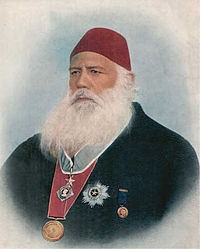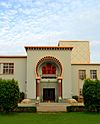
Sir Syed Ahmad Khan, also spelled Sayyid Ahmad Khan, was an Indian Muslim reformer, philosopher, and educationist in nineteenth-century British India.

The All-India Muslim League (AIML) was a political party established in Dhaka in 1906 when some well-known Muslim politicians met the Viceroy of India, Lord Minto, with the goal of securing Muslim interests in British India.
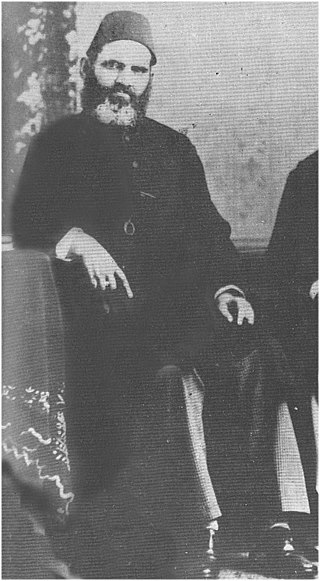
Nawab Mohsin-ul-Mulk, Munir Nawaz Jang, also known as Syed Mehdi Ali, was an Indian Muslim politician. He was a close friend of Syed Ahmed Khan, was involved in the Aligarh Movement and was one of the founders of the All India Muslim League in 1906.

Nawab Wiqar-ul-Mulk Kamboh was an Indian Muslim politician and one of the founders of All India Muslim League. Nawab Mushtaq Hussain or Nawab Wiqar Ul Mulk was also the maternal uncle of Sir Ziauddin Ahmed, a mathematician and pillar of the Aligarh Movement.
The Scientific Society of Aligarh was a literary society founded by Sir Syed Ahmad Khan at Aligarh, India. The main objectives of the society were to translate Western works on arts and science into vernacular languages and promote western education among the masses.

Nawab Sir Khwaja Salimullah Bahadur was the fourth Nawab of Dhaka and one of the leading Muslim politicians during the British rule in India.
Nawab Major Khwaja Hassan Askari was the sixth and last Nawab of Dhaka. He was born at the Ahsan Manzil Palace in Dhaka. He was the eldest son of Nawab Habibullah Bahadur and Shahryar Begum. He became the Nawab of Dhaka after his father's death in 1958.

Israt Manzil was one of the royal residences of the Nawabs of Dhaka. The mansion served as a retreat for members of the Dhaka Nawab Family.

Justice Syed Mahmood was Puisne Judge of the High Court, in the North-Western Provinces of British India from 1887 to 1893, after having served in the High Court in a temporary capacity as officiating judge on four previous periods since 1882.

The Council of State was the upper house of the legislature for British India created by the Government of India Act 1919 from the old Imperial Legislative Council, implementing the Montagu–Chelmsford Reforms. The Central Legislative Assembly was the lower house.

General elections were held in British India between 28 October and late November 1926 to elect members of the Imperial Legislative Council and the Provincial Legislative Councils.
Syed Nabiullah was a prominent barrister from Lucknow, India, and one of the eminent leaders of the All India Muslim League.
Maharaja Sir Mohammad Ali Mohammad Khan, Khan Bahadur, KCSI, KCIE was the Raja of Mahmudabad from 28 June 1903 to 23 March 1931 and a noted politician, zamindar of British India.
The Aligarh Movement was the push to establish a modern system of Western-style scientific education for the Muslim population of British India, during the later decades of the 19th century. The movement's name derives from the fact that its core and origins lay in the city of Aligarh in Central India and, in particular, with the foundation of the Muhammadan Anglo-Oriental College in 1875. The founder of the oriental college, and the other educational institutions that developed from it, was Sir Syed Ahmed Khan. He became the leading light of the wider Aligarh Movement.
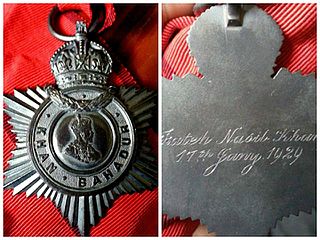
Khan Bahadur – a compound of Khan "Leader" and Bahadur "Brave" – was a honorary title in British India conferred on Indian subjects who were adherents of Islam or Zoroastrianism. The equivalent title for Hindus, Buddhists and Indian Christians was Rao Bahadur/Rai Bahadur and Sardar Bahadur for Sikhs. The title of Khan Bahadur was one degree higher than the title of Khan Sahib.
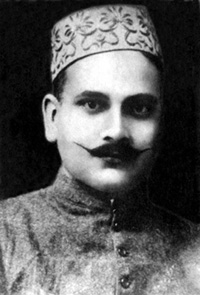
Khwaja Atiqullah was a Bengali British Indian politician and member of the Dhaka Nawab Family.

Syed Abdul Majid, CIE, also known by his nickname Kaptan Miah, was a politician, lawyer and entrepreneur. He is notable for pioneering the development in the agricultural and tea industry in British India as well as his contributions to both secular and Islamic education in Sylhet.

The Simla Deputation was a gathering of 35 prominent Indian Muslim leaders led by the Aga Khan III at the Viceregal Lodge in Simla in October 1906. The deputation aimed to convince Lord Minto, then Viceroy of india, to grant Muslims greater representation in politics.
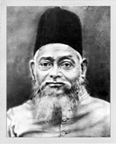
Khan Bahadur Abidur Reza Chowdhury was a Bengali politician and philanthropist. He was one of the founding members of the All-India Muslim League. The present-day Cumilla District Board auditorium is named after him.


